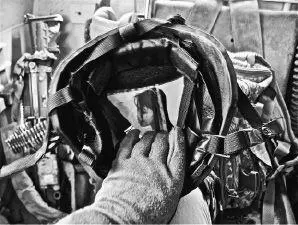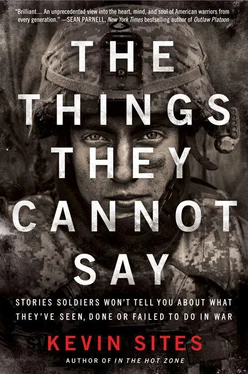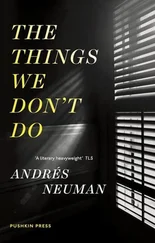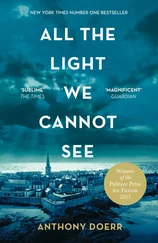While we lived through the dive, our jobs are now in jeopardy. Only through profuse apologies do we both avoid getting fired, and we will both be in the penalty box for several weeks. The gravity of our recklessness is compounded the next day, when another diver dies at Karpata, a victim not of deep diving but a reported pulmonary embolism. This diver found death but, unlike us, wasn’t looking for it. Because I pushed to make the dive, I begin to feel guilty about the fallout for Schoonhoven. It’s true he’s a big boy and able to make his own decisions, but he probably doesn’t need the added temptation of reckless endeavors dangled in front of him daily by someone who is supposed to be listening to his stories, not egging him on to new ones. However, he does not hold it against me. Despite our foolishness, we now have a bond that goes beyond our shared war zone experiences. Together we experienced the danger but also the solitude and peace of the deep. There is, we know, a bond of loyalty to each other in that as well.
A few days before I leave Bonaire to return to the United States and begin my fellowship at Harvard, I ask Schoonhoven why he agreed to share his stories with me for my book. He looks down, gathers his thoughts and sighs.
“I want a job where I can make okay money, enough to support my family and my [future] kids,” he says to me. “If there is a book with my memories in it, then I don’t have to hold them in my head; at least that’s what I hope.”
Postscript
After the birth of their first child, a daughter named Robyn, Sebastiaan and Carolien Schoonhoven returned to the Netherlands. A year and a half later they had their second child, a son named Finn.
Epilogue: Deus Ex Machina
And sometimes remembering will lead to a story, which makes it forever. That’s what stories are for. Stories are for joining the past to the future. Stories are for those late hours in the night when you can’t remember how you got from where you were to where you are. Stories are for eternity, when memory is erased, when there is nothing to remember except the story.
—Tim O’Brien,
The Things They Carried

The photograph of the author’s wife he carried in his helmet during his last reporting trip to Afghanistan
In my initial reporting and writing of this book, I was troubled that the stories featured here might collectively represent an indictment against hope. I’m glad to know now that I was wrong. War both gives and takes from those most intimately involved in it. It wrests from them delusions of innocence and reveals, as we’ve explored, a shadow self capable not only of taking life but sometimes of finding fulfillment in the process. This undoubtedly creates confusion for both soldiers and the societies they fight for, as the seduction of violence challenges self-perceptions and even our beliefs about our own humanity. Additionally, living in the midst of death, witnessing the killing of comrades and friends, suffering physical and psychological injuries, compounds this disequilibrium for warriors in the aftermath of battle. So how, then, does one go forward in a world marked by pain and loss, and steeped in the moral inconsistency that those capable of the greatest violence win?
The truth I’ve been able to discern from my interviews and personal experiences in war is the not-unfamiliar concept that it magnifies the duality of our nature—our capacity for good and propensity for evil—and has an unequaled power to unite and divide us, to fill us simultaneously with pride and shame. But the piece that we are only beginning to more fully embrace (out of necessity, with thousands of American troops returned or returning home from the wars in Iraq and Afghanistan) is that that same sense of duality can destroy us if we do not honestly share its full and complete narrative. As difficult and perhaps unnatural as it may be, that sharing must include giving voice to the natural excitement and fellowship of war as well as communalizing its grief.
Of the stories told here, there is hope in all, some in the ability to bear well the terrible responsibilities of killing in war, as in the case of Staff Sergeant Mikeal Auton; some in the promising results of the ongoing recovery process, as with Lance Corporal James Sperry; and others simply in the courage and willingness to explain what can happen to you once you pull the trigger, as in the case of the late Corporal William Wold. We owe all these men a debt, not simply for their service, but for their willingness to help us understand just a little bit better. We must implore and help the others who follow to do the same.
Fortunately, there is a thread of hope in my own story that was the result of this very thing—being willing to do the work of sharing my own fractured narrative and reconstructing a new one grounded in hope and purpose, instead of ending in self-destruction. Though I didn’t know it at the time, it began almost comically, and with no other likely solution in sight, as my own personal deus ex machina, a god from a machine, the savior from the final act of a Greek tragedy, literally suspended from a series of ropes and pulleys.
Her name was Anita. We met in Joshua Tree National Park at a rock-climbing class in the summer of 2008. At only four foot eleven she had what most would consider an understandable fear of heights, yet as was her style, it was something she was ready to take on without hesitation, like the many other challenges she had already dispatched in her life. We had a natural banter, chatting and laughing. At one point during the class, she put her hands on her hips in a feigned sign of impatience, asking me why it was taking me twice as long as the others to tie the knot that I would use to “belay” her, or anchor her against a possible fall as she climbed. I looked at her as if she was crazy and told her that this was quite obviously the one knot she might want me to take the time to get right.
It felt very much like flirting and probably was, at least on my part, but we were both in other relationships. We became friends instead, meeting for dinner or drinks with our significant others in tow but focusing our conversations on each other. We talked at a frantic pace like two idiots bailing out a rowboat. Later, I invited her to hike Temescal Canyon with me and another friend. My girlfriend at the time chose not to go. Over the course of three hours, amid breathtaking vistas of the Pacific, Anita and I again spoke nonstop. There was more to this feisty Filipina, I learned, than just her sarcasm and expensive boots.
After an American sailor married her mother, she came to the U.S. at age thirteen and learned to speak English by watching General Hospital on TV. Despite his strict discipline, she became close to her adopted father, learning to love sports as he did, especially his hometown football and baseball teams, the Patriots and the Red Sox. She became a successful advertising executive, married her college sweetheart and had a daughter, but divorced just two years after her birth. I admired her strength and tenacity and was enthralled by the oversized personality that fit inside the travel-sized woman. When my relationship with my girlfriend ended shortly before I left Los Angeles for my fellowship at Harvard, I tried to reconnect with Anita but ran out of time. And so began what should’ve been a year of enlightenment, meeting accomplished fellow journalists and immersing myself in the myriad of offerings at America’s preeminent institution of higher learning, but instead I traveled down what I consider the long, dark corridor of my life.
Читать дальше













